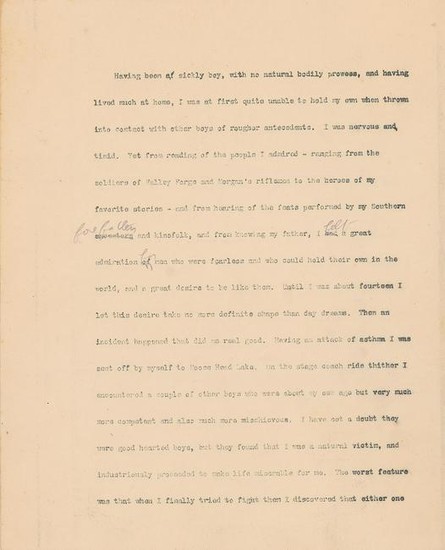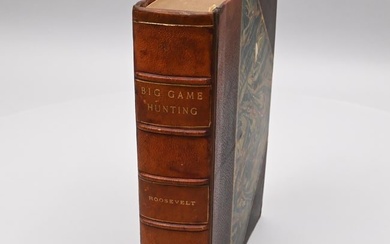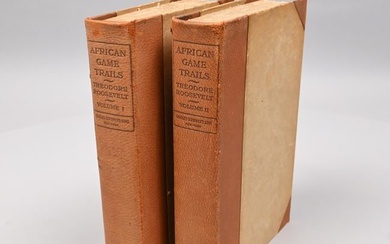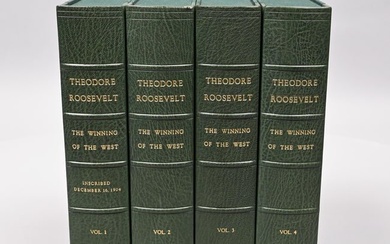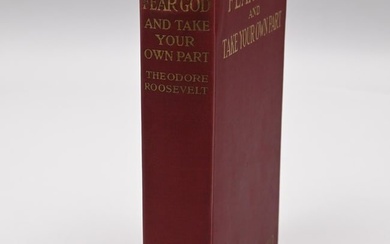Theodore Roosevelt
Typed working manuscript draft from the 1913 book Theodore Roosevelt: An Autobiography, four pages, 8.5 x 10.5, hand-corrected with about nineteen words in pencil by Theodore Roosevelt, plus a few punctuation marks and strikethroughs. The excerpt comes from 'Chapter II: The Vigor of Life,' beginning with the second paragraph of the as-published text: "Having been a sickly boy, with no natural bodily prowess, and having lived much at home, I was at first quite unable to hold my own when thrown into contest with other boys of rougher antecedents." This text is essentially identical to the published book, which incorporates Roosevelt's handwritten changes, including the words "forefathers," "felt," "for," "but," "and yet," "in return," "prowess," "Heenan," "approximating," and "good." One passage, in which Roosevelt writes the word "boxing," differs slightly from the final draft version. In these four pages, Roosevelt discusses his sickly youth as an asthmatic, boxing lessons and triumphs, and horseback riding. In fine condition. Accompanied by a custom-made clamshell presentation case and a 1920 illustrated edition of the autobiography.
In 1872, at the age of thirteen, Theodore Roosevelt was sent on a 500-mile excursion by train and stagecoach from Manhattan Island to Moosehead Lake in Maine to convalesce after several bouts of asthma. Upon his arrival, however, Roosevelt was soon bullied by the other boys at camp, with their physicality and pugilistic prowess compelling him to change his own vulnerable status as the victim: “The experience taught me what probably no amount of good advice could have taught me. I made up my mind that I must try to learn so that I would not again be put in such a helpless position.”
With his “father’s hearty approval,” Roosevelt began taking boxing lessons under the guidance of John Long, an ex-prize fighter who held at the camp “a series of ‘championship’ matches for the different weights.” Roosevelt was placed in the light-weight bracket and, much to his surprise, “and to John Long’s,” he proceeded to defeat “a couple of reedy striplings” and win the division, securing in victory a commemorative pewter mug that Roosevelt asserts “became one of my most prized possessions.” The tourney proved to be a galvanizing moment for the young fighter, who, some forty years later, declared the event as “the only one of my rare athletic triumphs which would be worth relating.”
Although he admittedly never attained “first rank,” Roosevelt made the art of boxing, with its inherent ameliorative effects, an integral part of his active lifestyle. Urged on by a deep-seated aspiration of emulating his heroes, “men who were fearless and who could hold their own in the world,” Roosevelt continued to box and train well into his White House years, up and until a well-placed cross by a superior sparring partner partially blinded his left eye. According to Roosevelt: ‘I thought it better to acknowledge that I had become an elderly man and would have to stop boxing. I then took up jiujitsu for a few years.’ A remarkable manuscript detailing the sequence of events that sparked the transformation of a future Rough Rider, big game hunter, and American president.
Format: Hand-Annotated Manuscript
View it on
Estimate
Time, Location
Auction House
Typed working manuscript draft from the 1913 book Theodore Roosevelt: An Autobiography, four pages, 8.5 x 10.5, hand-corrected with about nineteen words in pencil by Theodore Roosevelt, plus a few punctuation marks and strikethroughs. The excerpt comes from 'Chapter II: The Vigor of Life,' beginning with the second paragraph of the as-published text: "Having been a sickly boy, with no natural bodily prowess, and having lived much at home, I was at first quite unable to hold my own when thrown into contest with other boys of rougher antecedents." This text is essentially identical to the published book, which incorporates Roosevelt's handwritten changes, including the words "forefathers," "felt," "for," "but," "and yet," "in return," "prowess," "Heenan," "approximating," and "good." One passage, in which Roosevelt writes the word "boxing," differs slightly from the final draft version. In these four pages, Roosevelt discusses his sickly youth as an asthmatic, boxing lessons and triumphs, and horseback riding. In fine condition. Accompanied by a custom-made clamshell presentation case and a 1920 illustrated edition of the autobiography.
In 1872, at the age of thirteen, Theodore Roosevelt was sent on a 500-mile excursion by train and stagecoach from Manhattan Island to Moosehead Lake in Maine to convalesce after several bouts of asthma. Upon his arrival, however, Roosevelt was soon bullied by the other boys at camp, with their physicality and pugilistic prowess compelling him to change his own vulnerable status as the victim: “The experience taught me what probably no amount of good advice could have taught me. I made up my mind that I must try to learn so that I would not again be put in such a helpless position.”
With his “father’s hearty approval,” Roosevelt began taking boxing lessons under the guidance of John Long, an ex-prize fighter who held at the camp “a series of ‘championship’ matches for the different weights.” Roosevelt was placed in the light-weight bracket and, much to his surprise, “and to John Long’s,” he proceeded to defeat “a couple of reedy striplings” and win the division, securing in victory a commemorative pewter mug that Roosevelt asserts “became one of my most prized possessions.” The tourney proved to be a galvanizing moment for the young fighter, who, some forty years later, declared the event as “the only one of my rare athletic triumphs which would be worth relating.”
Although he admittedly never attained “first rank,” Roosevelt made the art of boxing, with its inherent ameliorative effects, an integral part of his active lifestyle. Urged on by a deep-seated aspiration of emulating his heroes, “men who were fearless and who could hold their own in the world,” Roosevelt continued to box and train well into his White House years, up and until a well-placed cross by a superior sparring partner partially blinded his left eye. According to Roosevelt: ‘I thought it better to acknowledge that I had become an elderly man and would have to stop boxing. I then took up jiujitsu for a few years.’ A remarkable manuscript detailing the sequence of events that sparked the transformation of a future Rough Rider, big game hunter, and American president.
Format: Hand-Annotated Manuscript
